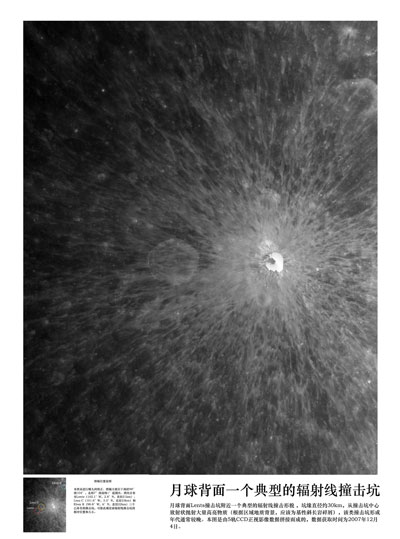|

A picuture of the dark side of the moon, taken by China's lunar orbiter Chang'e I, is released by the China National Space Administration on December 11, 2007. [cnsa.gov.cn]
|
BEIJING -- The charge-coupled device (CCD) camera on Chang'e I, China's first lunar orbiter, has started imaging probes on the dark side of the moon and captured photos of parts of this region, the China National Space Administration (CNSA) announced Tuesday.
The CNSA said that the orbiter is operating normally in terms of flying, probing, land control and communication, as well as data transmitting and processing.
The CNSA released the first picture of the moon captured by Chang'e I on November 26, marking the full success of the lunar probe project.
Chang'e I, named after a mythical Chinese goddess who, according to legend, flew to the moon, blasted off on a Long March 3A carrier rocket at 6:05 pm on October 24 from the Xichang Satellite Launch Center in the southwestern Sichuan Province.
The 2,350-kg satellite carries eight probing facilities with a range of instruments. These include a three-dimensional camera and an interferometer (a set of two or more telescopes that combine their signals to improve resolution), an imager and gamma/x-ray spectrometer, a laser altimeter, a microwave detector, a high-energy solar particle detector and a low-energy ion detector.
The mission has four objectives: a three-dimensional survey of the lunar surface; an analysis of the abundance and distribution of elements on the lunar surface; an investigation of the characteristics of lunar regolith (loose, fragmented surface material) and the powdery soil layer on the surface, and an exploration of the conditions between Earth and the moon.
